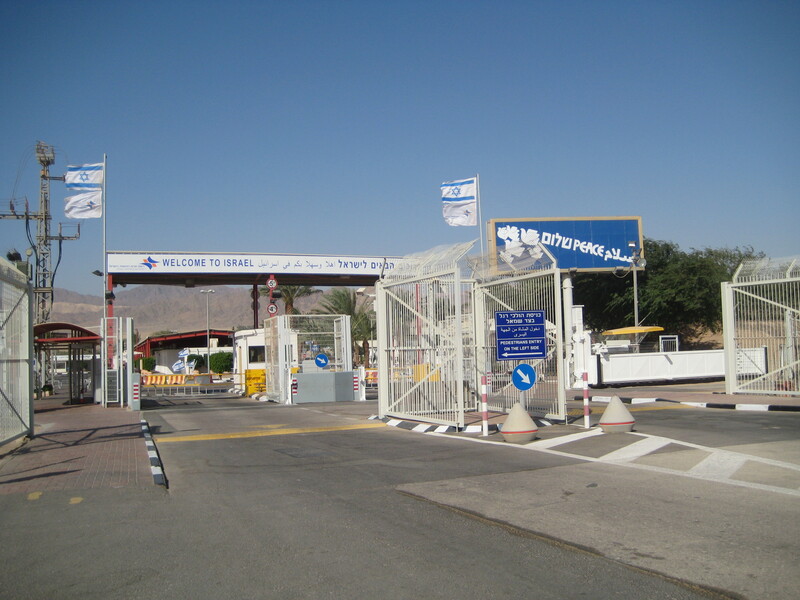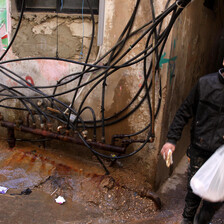The Electronic Intifada 24 February 2014

Humanitarian workers habitually find themselves unwelcome, detained or turned back at Israeli-controlled border crossings. (Joe Goldberg)
The Israeli detention of and denial of entry to Western activists, academics and humanitarian workers sympathetic to Palestinians has received particular attention in recent years, following the targeting of high-profile figures including Richard Falk, Norman Finkelstein and Noam Chomsky.
During the first week in February, I was on the receiving end of Israeli detention practices myself when I attempted to enter the occupied West Bank from neighboring Jordan via the Allenby Bridge border crossing.
Once on the Israeli-controlled side of the crossing, I was detained and interrogated for 12 hours before being denied entry and sent back to Amman. I have been given a five-year ban on entering Israel, the occupied West Bank and Gaza Strip.
The Israeli authorities also detained and interrogated my friend and fellow traveler, who had never previously visited the region.
For those who follow events and developments in Palestine, my experience will be unsurprising; stories of random and unexplained clampdowns are depressingly familiar.
The opacity, lack of due process and disregard for human rights that characterize Israeli detention practices also typify the occupation authorities’ actions in the West Bank (including occupied East Jerusalem) and Gaza.
If the Israeli government will openly flout countless UN resolutions, it is hardly going to care about a traveler’s right to privacy.
Nevertheless, the nature and manner in which I was detained and interrogated remain of value for what they reveal about the Israeli occupation and how it continues to operate in 2014.
Opacity
Most fundamentally, the Israeli detention of “undesirable” travelers provides a terrifying insight into the daily lives of millions of Palestinians, who go without the protections of a Western passport.
For all the fear and horror of my experience, I ultimately knew that the worst thing the Israeli authorities could do was detain and eventually deport me.
Palestinians have no such guarantee.
Moreover, during my detention and multiple interrogations I came face-to-face with the impunity and unaccountability of the system, maintained by way of total opacity.
On a superficial but symbolic note, all the Israeli occupation personnel wore badges with information in Hebrew only — a language which the majority of detainees and travelers through this crossing will not be able to read. We were given no information or explanations as to what was happening.
No recourse
When I was eventually informed that I had been denied entry, one reason given was “some information we found.” My request for further details was denied.
As anyone who has passed through a checkpoint in the West Bank will know, this impunity and arbitrariness is a central part of how the occupation works, and how it continues to exert power.
The time one has to wait, and whether or not one is allowed through, can all too often depend on the mood and character of whoever is on duty.
Entry can be denied with no reason and if this happens, there is no recourse.
My detention was also indicative of Israel’s increased targeting of non-governmental organizations (NGOs).
I have previously volunteered in Bethlehem in a program organized by a British NGO; more recently I worked for the London-based charity Medical Aid for Palestinians (MAP).
My interrogators questioned me about this work at length, fixating particularly on pushing me to provide the names and contact details of Palestinians I knew in the West Bank (disappointingly for the Israeli staff, I was unable to oblige as nearly all the Palestinians I know are in the diaspora).
They were also interested in my journalistic work, asking me about the articles I have previously written for The Electronic Intifada.
While I had thought that a state facing a supposedly serious security threat might have a better use for its resources than interrogating a London-based humanitarian worker, it was interesting to discover just how gravely any work with Palestinians is regarded.
Unsurprisingly, my current employment with a poverty-relief organization that operates in sub-Saharan Africa was of little interest.
Strategic clampdown
On a similar note, the detention of international humanitarian workers is part of a strategic clampdown on non-violent activism. It was clear from how I was treated that the border staff did not believe I posed a physical threat.
I was frisked but not strip-searched and my belongings only went through the normal security checks. Although I was detained, interrogated and watched, I was not closely physically guarded.
Most of the time I was able to walk around the “waiting room” and go to the bathrooms without a guard accompanying me. My friend, who was also interrogated, was not searched at all throughout the detention period.
After 12 hours the Israelis announced that she was allowed to enter, although she chose to return to Jordan too.
This treatment is inconsistent if the border staff genuinely believed that I might pose a physical threat. It would appear that the intellectual threat is of greater concern.
Insecurity
Finally, the behavior of the Israeli border staff towards Westerners of Arab descent can be seen as a microcosm of the broader disregard with which Israel now routinely treats its international relations.
As a UK citizen, I remember the controversy that hit the headlines four years ago when it emerged that members of Mossad had carried out assassinations in Dubai on British passports, using identities stolen from people traveling through Ben Gurion Airport near Tel Aviv (“Britons queued at Ben Gurion airport as Israeli officials cloned passports,” The Guardian, 24 March 2010).
The incident sparked unprecedented fury, with the then foreign secretary David Miliband issuing a strongly-worded statement and expelling an Israeli diplomat from London (“Britain expels Israeli diplomat over Dubai passport row,” BBC News, 23 March 2010).
After this, the Foreign Office issued new guidelines advising Britons not to part with their passports when entering through Israeli-controlled frontiers (“Don’t hand passport to officials, FCO tells Britons travelling to Israel,” The Guardian, 24 March 2010).
Notwithstanding the diplomatic row with a supposed ally, identical policies continue to operate in Israel.
Despite the ostensible show of strength that is central to detention practices, what my experience has ultimately revealed is the insecurity that lies at the heart of the Israeli state.
Robust democracies do not just tolerate criticism; they welcome it as a part of freedom of expression.
We are all used to hearing that Israel is “the only democracy in the Middle East,” according to a whole range of definitions. For now at least, those definitions continue to be stretched to the point of being unrecognizable.
Anne Irfan holds a masters degree in Middle Eastern history. She is based in London and works in international development.





